Gaining the trust of a dog who has had no human interaction is never easy. It requires dedication, patience, and a lot of love.
The rescuers at Hope For Life Rescue, in Virginia, were up for that task.
As soon as a shelter asked them to take a frightened mama dog named Lovebug and her fourteen newborn babies into their care, they immediately agreed to help.
Lovebug was picked up on the streets, and she was extremely distrustful of humans.
The staffers received the canine family with outstretched arms, determined to give them love and gain their trust.
The Mama Dog And Her Babies Are Safe
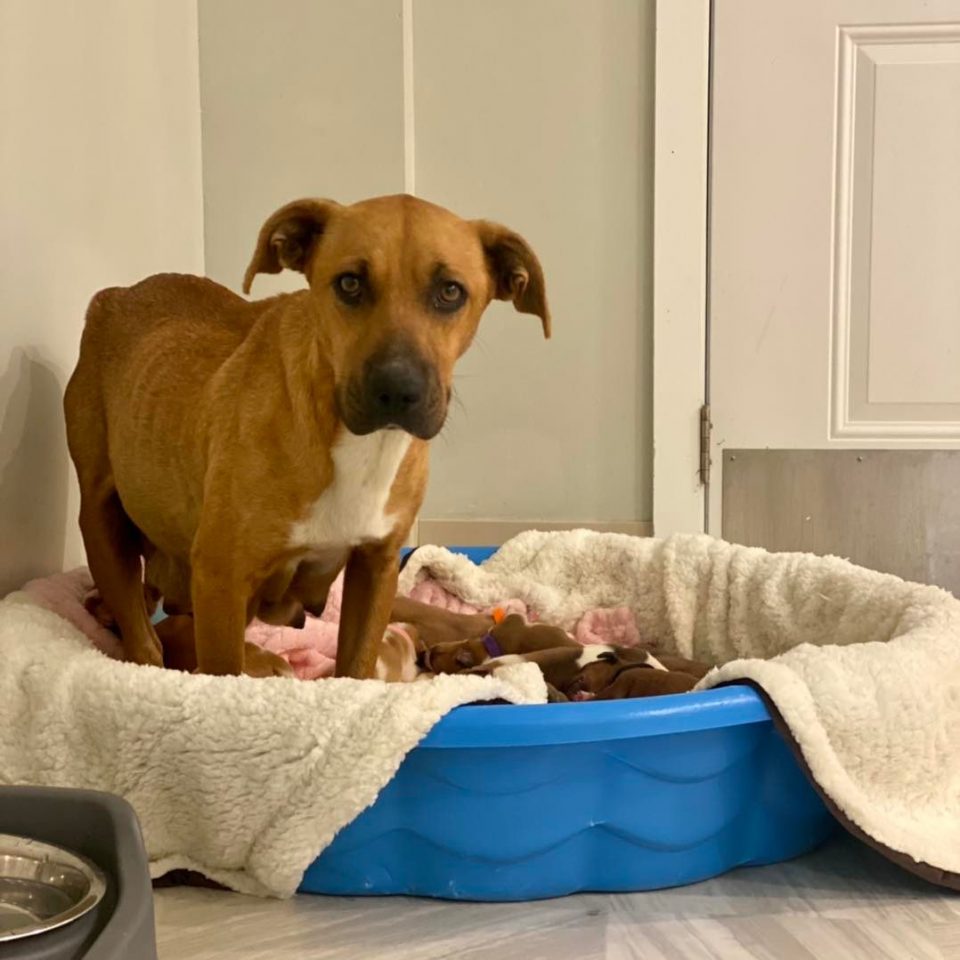
At first, Lovebug didn’t let the rescue staff touch her or her puppies. She became overwhelmed with fear whenever she saw the staffers approaching them.
“I remember walking in the room and seeing her cowered in the corner over top of her two-day old babies. She was so scared. Shaking and not letting us get too close to her or the babies,“ one of her rescuers told The Dodo.
The rescuers’ hearts became filled with sadness.
They were resolved to give the dog and the puppies the best possible care, and they set up a private room at Hope Center for Lovebug and her babies.
Taking care of fourteen furbabies was difficult for the malnourished mama dog. Her rescuers were concerned about her weight and they made sure she ate nutritious meals.
Miss Susie, one of the volunteers, cooked chicken for Lovebug every day.
Lovebug Realizes That She’s Loved
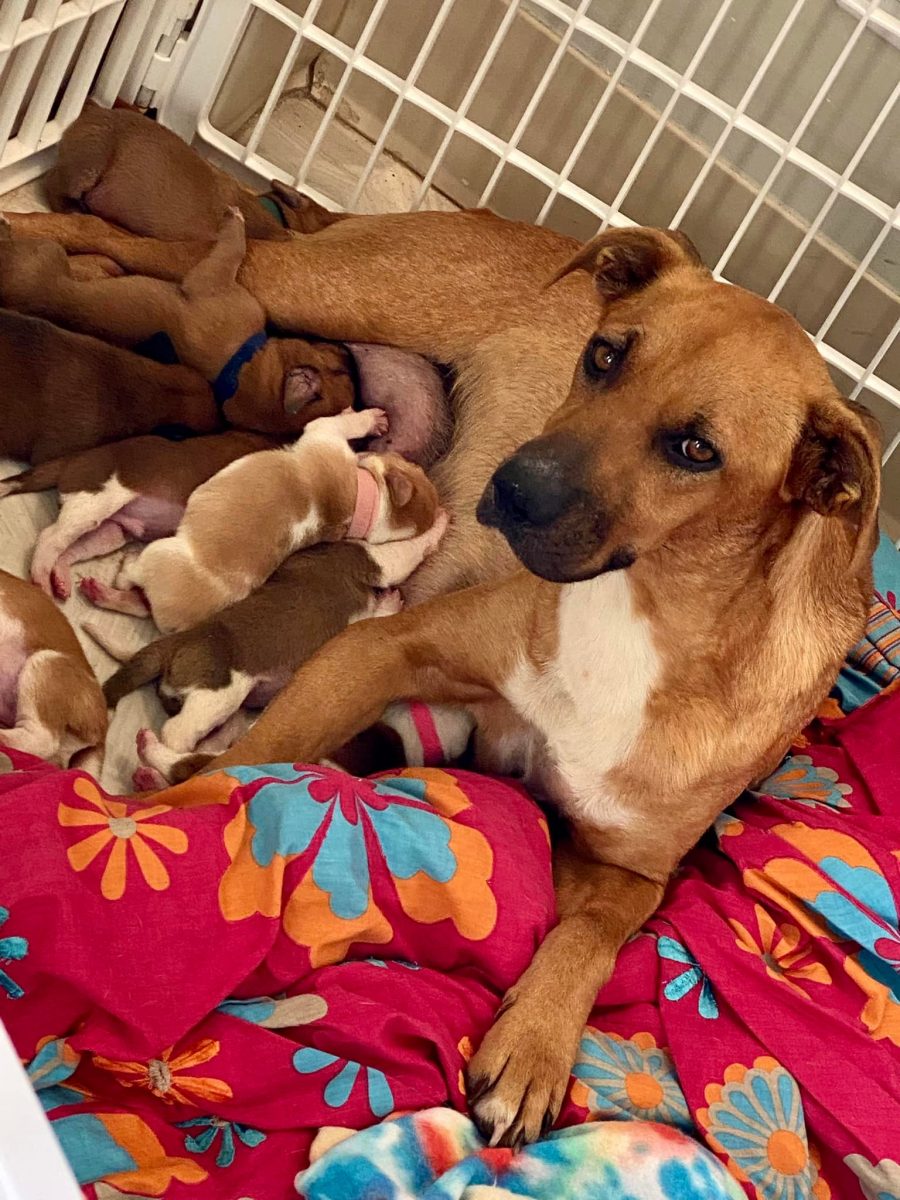
A couple of days later, Lovebug let the staff touch her babies and weigh them to determine which puppy needed supplements. The mama dog started trusting her rescuers, but she didn’t let them pet her.
The kind-hearted people didn’t give up, and they kept working with her, giving her the time she needed.
The staff and volunteers had socialization sessions with Lovebug. They hand-fed her, spent time talking to her, and lying with her on the floor.
They were moved by Lovebug’s exceptional care of her puppies.
The babies quickly thrived, and they ran after their mom to get more milk. The rescuers relished playing with the puppies and getting to know their personalities.
After some time, Lovebug realized that she was safe and loved, and she let her rescuers stroke her.
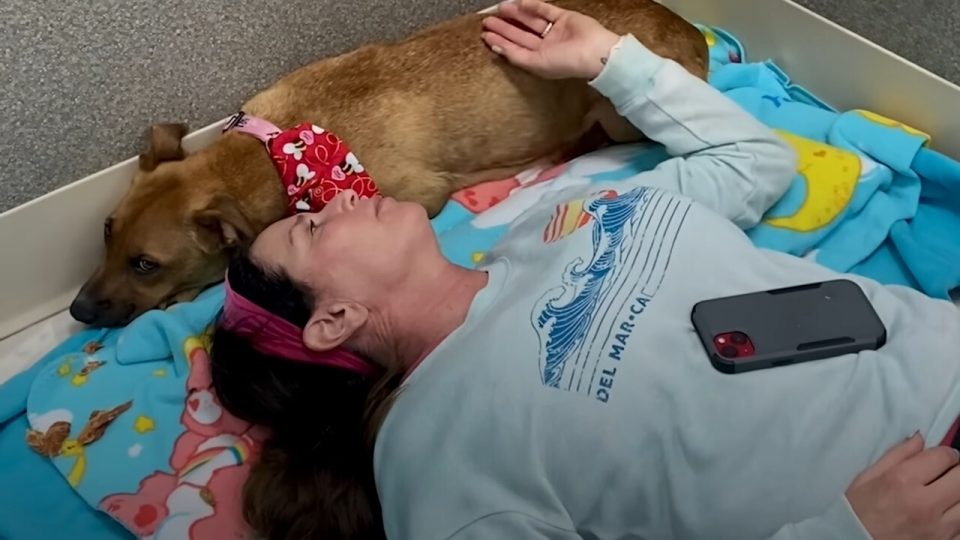
Once her fur babies reached adoptable age, they found their forever homes.
Lovebug could focus on herself. Her rescuers knew that she needed a lot of time and love. They gave her countless kisses, wishing they could take all her fears away.
Shortly after all her puppies found homes, the mama dog started gaining weight. The volunteers continued visiting her in order to socialize with her. They often read books to her.
Getting Her Happy Ending
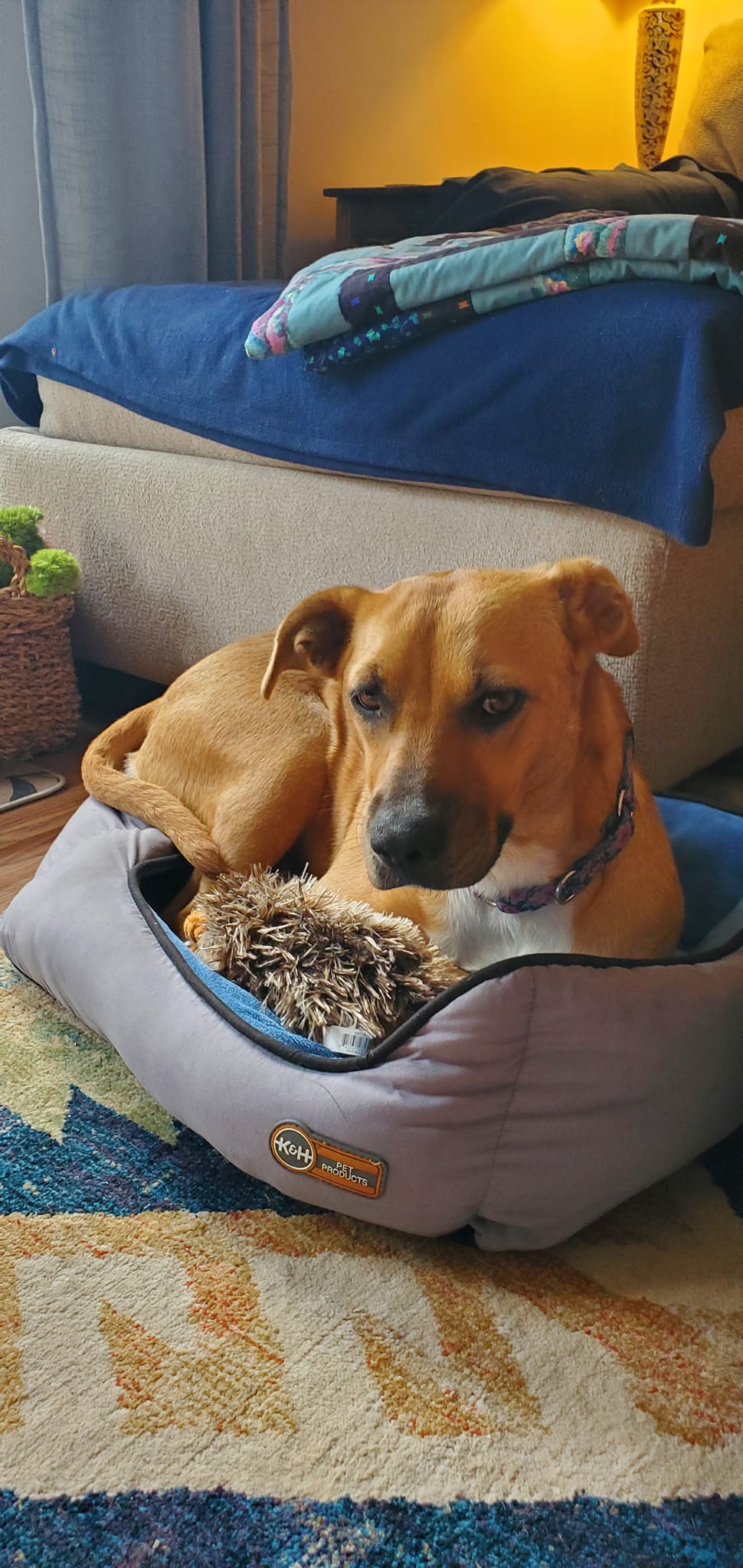
In order to trust humans again, Lovebug was placed in a loving foster home.
Her foster family showed her a lot of love and kindness. Lovebug was glad to spend time with her foster dog brothers, who helped her rebuild her confidence.
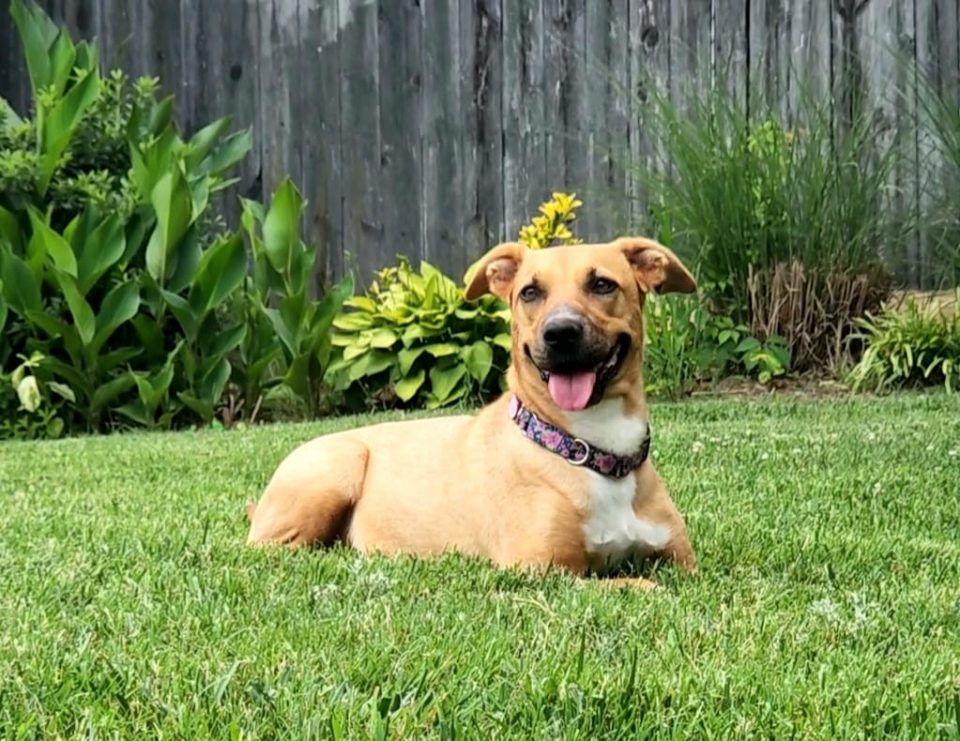 The sweet pup started smiling, and her eyes shined brightly. Lovebug enjoyed cuddling with her foster parents and taking in all their love.
The sweet pup started smiling, and her eyes shined brightly. Lovebug enjoyed cuddling with her foster parents and taking in all their love.
She started searching for her happily ever after.
Lovebug’s happiness was complete when she met her forever parents. The doggo stole their hearts immediately.
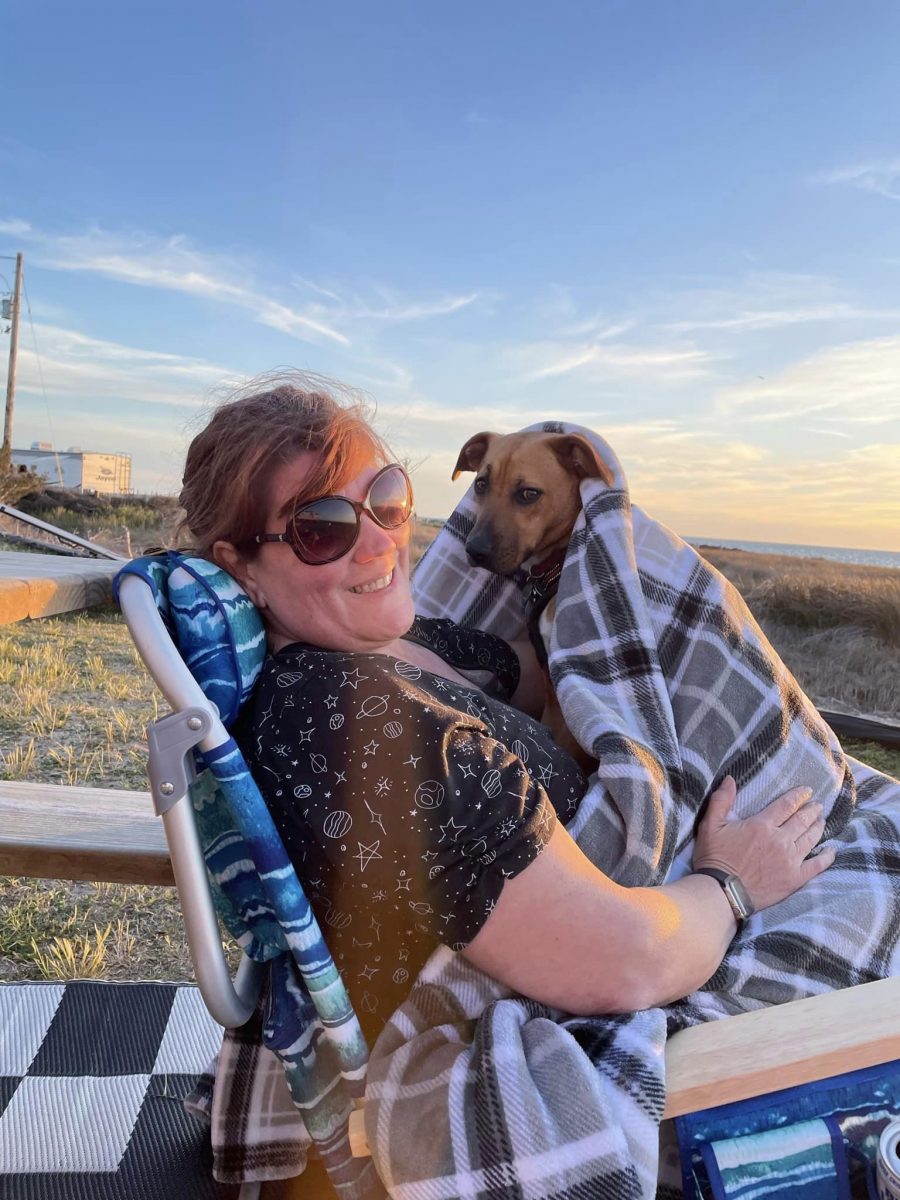
Lovebug moved to her forever home, and they changed her name to Ruby. Her parents absolutely adore her and shower her with love.
Ruby lives her best life in Virginia. She loves going camping with her family and playing with her furry siblings, Beamer and Charlotte.
If you’ve ever noticed your furry friend having a case of the hiccups, you’re not alone. Dogs, just like humans, can experience these sudden, involuntary contractions of the diaphragm. It’s a curious sight, seeing your pup make those little “hic” sounds, but have you ever wondered why it happens? Understanding the reasons behind why dogs get hiccups can shed light on this common yet mysterious occurrence. So, next time your canine companion starts hiccuping, you’ll know there’s more to it than meets the eye. Let’s unravel the mystery behind this quirky canine behavior together.
Understanding Hiccups in Dogs
What Are Hiccups and How Do They Occur?
Hiccups in dogs are similar to those in humans – they are sudden, involuntary contractions of the diaphragm. Just like us, our furry friends can have these funny episodes where their abdominal muscles contract, causing the characteristic sound of hiccups. It’s a common occurrence that might make you wonder what triggers these hiccups in your dog.
The Diaphragm and Its Role in Hiccups
The diaphragm, a vital muscle responsible for breathing, plays a crucial role in hiccups. When the diaphragm contracts involuntarily, it causes a quick intake of breath, followed by the closure of your dog’s vocal cords, creating that familiar “hic” sound. While the exact reason behind why dogs get hiccups isn’t always clear, it’s believed to be associated with various factors such as eating or drinking too quickly, excitement, stress, or even temperature changes.
Exploring the Reasons Why Dogs Get Hiccups
Puppyhood and Hiccup Frequency
As puppies, dogs are more prone to hiccups due to their developing diaphragm muscles. Just like human babies, they may experience hiccups as part of their growth process. You might notice your puppy hiccuping more frequently than adult dogs, and that’s perfectly normal.
The Impact of Diet on Canine Hiccups
Diet plays a significant role in triggering hiccups in dogs. Feeding your furry friend too quickly or giving them large meals can lead to hiccups. It’s essential to maintain a consistent feeding schedule and portion sizes to reduce the likelihood of hiccups caused by eating habits.
Excitement and Rapid Breathing as Triggers
When your dog gets overly excited or engages in intense play, they may start breathing rapidly, which can sometimes result in hiccups. Excitement-induced hiccups are common and typically subside on their own. Keeping your dog calm during high-energy activities can help minimize the occurrence of hiccups.
Temperature Changes and Hiccups in Dogs
Sudden temperature changes can also trigger hiccups in dogs. Going from a warm environment to a cold one or vice versa can sometimes cause their diaphragm to spasm, leading to hiccups. Ensure your furry companion is comfortable and gradually acclimated to temperature changes to prevent hiccups associated with environmental shifts.
Comparing Canine and Human Hiccups
Similarities in Hiccup Mechanisms
You may wonder if your furry friend’s hiccups are similar to yours. Well, the good news is that they are! Dogs and humans both experience hiccups due to sudden contractions of the diaphragm – the muscle responsible for breathing. Just like when you hiccup, your dog’s diaphragm has a little spasm causing a quick inhalation of air, followed by a closure of the vocal cords, creating that distinctive sound.
Differences in Hiccup Patterns and Causes
While the mechanism behind hiccups is alike, there are some variations in how and why dogs and humans hiccup. For example, dogs tend to hiccup less frequently than humans. Puppies, in particular, may hiccup more often as their diaphragm muscles are still developing. In terms of triggers, dogs’ hiccups can be provoked by factors like excitement, rapid eating, stress, and sudden changes in temperature, just like humans. However, diet plays a significant role in canine hiccups, with feeding habits and portion sizes influencing the occurrence of these involuntary spasms.
Make sure to observe your pup when they have hiccups. In most cases, hiccups are harmless and will pass on their own. However, if your dog’s hiccups are persistent or accompanied by other concerning symptoms, it’s best to consult your veterinarian.
Dealing With Your Dog’s Hiccups
When to Worry About Your Dog’s Hiccups
If your dog experiences occasional hiccups that resolve on their own, there’s usually no need for concern. However, if hiccups are frequent, persistent, or accompanied by other symptoms like difficulty breathing, lethargy, or signs of distress, it’s essential to consult your veterinarian. These could indicate underlying health issues that require attention.
Simple Remedies to Alleviate Hiccups in Dogs
When your dog has hiccups, you can try a few simple remedies at home to help alleviate them. Ensure your furry friend stays calm and relaxed, as stress and excitement can exacerbate hiccups. Encourage your dog to drink small amounts of water to help soothe the diaphragm. Gentle belly rubs or distractions such as playtime can also help manage hiccups. Avoid feeding your dog immediately after exercise, as this can trigger hiccups. Remember, most hiccups in dogs are harmless and resolve on their own.
Preventative Measures for Reducing Hiccups
Tips for Feeding and Hydration
When it comes to your furry friend’s meals and drinks, a few adjustments can help reduce the chances of those pesky hiccups. To prevent hiccups caused by eating too quickly, try using specialized slow-feed bowls. These bowls have obstacles that make dogs eat slower, aiding in digestion and reducing air intake. Moreover, ensure your pup stays hydrated throughout the day. Proper hydration can prevent hiccups triggered by throat irritation.
Stress Reduction and Environmental Comfort
Just like you, your dog can get stressed, leading to hiccups. Creating a calm environment for your pup can work wonders in minimizing stress-related hiccups. Provide your dog with a cozy and safe space where they can relax. Engage in calming activities together like soothing massages, gentle playtime, or peaceful walks. Keeping your furry companion happy and stress-free can significantly decrease the occurrence of hiccups.
Remember, a few simple adjustments in your dog’s routine can go a long way in preventing those bothersome hiccups. By focusing on their feeding habits, hydration, stress levels, and surroundings, you can help keep those hiccup episodes at bay.
Conclusion
So, there you have it – the mystery of why dogs get hiccups unraveled! From rapid eating to excitement, stress, and even temperature changes, various factors can trigger these cute little spasms in our furry friends. Whether it’s a puppy developing those diaphragm muscles or a full-grown dog gulping down food too quickly, hiccups are just a part of their quirky charm. Remember, most of the time, hiccups are harmless and will pass on their own. But if they persist or come with other concerning symptoms, it’s always best to consult your vet. Keep your pup calm, offer some water, and maybe a gentle belly rub to ease those hiccups. And don’t forget, a happy and stress-free environment goes a long way in keeping those pesky hiccups at bay.
Frequently Asked Questions
What causes hiccups in dogs?
Hiccups in dogs can be triggered by factors like rapid eating, excitement, stress, and sudden temperature changes, affecting the diaphragm’s involuntary contractions.
Why do puppies seem to hiccup more often?
Puppies may experience more hiccups due to developing diaphragm muscles as they grow, coupled with their energetic and excitable nature.
Are hiccups in dogs similar to human hiccups?
Yes, both canine and human hiccups involve contractions of the diaphragm, but the triggers and patterns may differ between the two species.
When should I be concerned about my dog’s hiccups?
While hiccups are typically harmless and brief, persistent hiccups or accompanying symptoms warrant a visit to the vet for further evaluation.
How can I help alleviate my dog’s hiccups?
Simple remedies include calming your dog, offering small amounts of water, gentle belly rubs, and avoiding feeding right after exercise.
[no_toc]

Hey there, I’m Janet Brooks, a dog-loving student from California. I’m all about helping pups in need, especially those without homes. Me and my awesome friends work together to give shelter and love to stray dogs. Oh, and I also write blogs about dogs to share helpful info.